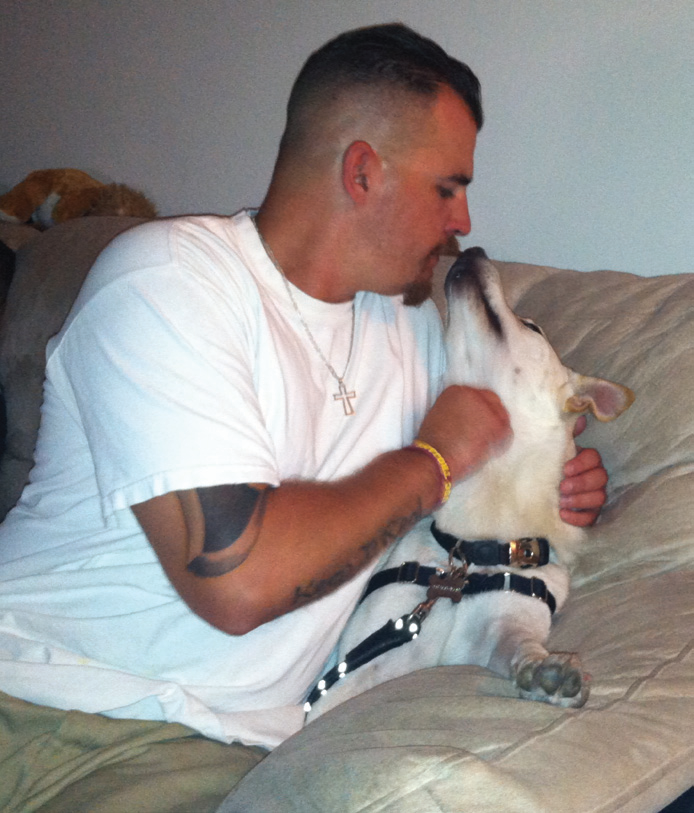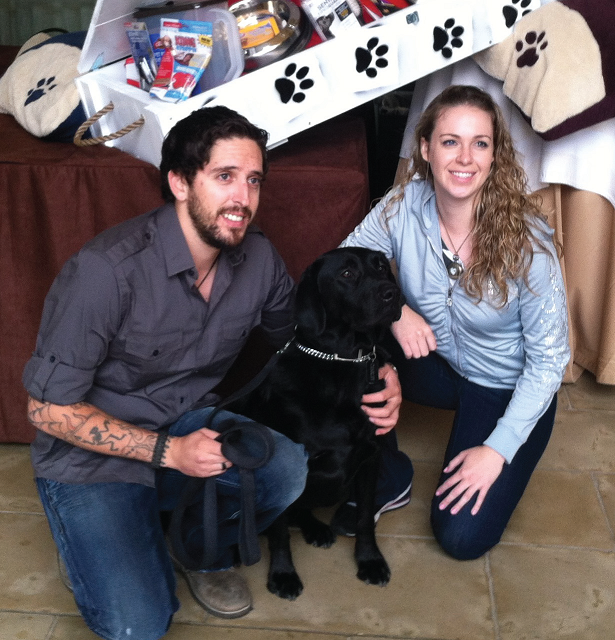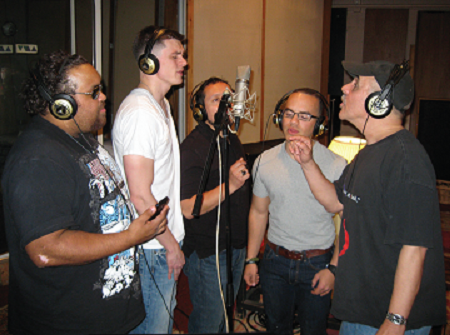By Noelle Bernard
FOR IRAQ AND AFGHANISTAN WAR VETERANS, THE COST OF WAR HAS LEFT LIFE-ALTERING INJURIES THAT MAKE RETURNING TO CIVILIAN LIFE DIFFICULT. The long-term effects of these conflicts have put strains on veterans’ hospitals struggling to properly meet needs as the country’s 12.5 million non-elderly veterans grows in number.
To help alleviate such strains, veterans’ programs operated by individuals have sprung up to offer uniquely crafted programs that intimately reach veterans. Programs that target veterans’ vulnerability by giving free yoga lessons, pets, or an outlet for musical expression are delivering unexpected results.

One of the veteran-pet (Sergeant Adam Renteria and Rakassan) matches. His story is on the Pets for Vets website.
One of these programs dedicated to helping veterans find their way to normalcy is Yoga for Vets. Director and former U.S. Navy deep-sea diver Paul Zipes started this program because yoga helped him ease the stresses of military life.
“From a military standpoint, everyone agrees that somebody who is less stressed is more effective, that it’s important for us to have an effective military that thinks clearly under pressure for what they’re required to do,” Zipes says. “Yoga is by far the best fit for giving them an option to handle stress better and to improve their physical fitness and mental stability.”
Yoga for Vets is a nonprofit organization that databases yoga studios countrywide, offering a minimum of four free yoga lessons to any military veteran. The program has more than 600 studios listed, but is working to offer free classes for veterans in every studio in the country.
Zipes says veterans’ testimonials reassure him of the program’s significance. One standout was a combat veteran struggling with PTSD, at his wit’s end after all other military programs failed him. He took one of Zipes’ classes, feeling he had nothing left to lose.
“I went over to him and quietly asked him how he felt after the [first] class,” says Zipes. “After a very long pause he looked me in the eye and said, ‘I had one of the best night’s sleeps I’ve had in a year after that class.’ That moment confirmed everything that I’d hoped Yoga for Vets could be.”
Animals are also giving veterans renewed hope. Pets for Vets is a program that promotes healing through the unconditional love of pets. A military veteran is given the companion of a trained shelter dog or requested pet for free, which in turn gives both a second chance at life.

A group made this toy crate to look similar to a foot locker, filled it with Welcome Package items, and donated it to Pets for Vets. Pictured is David Harlan and his dog Charley with founder Clarissa Black.
“It’s unique because we identify the veteran first,” says Ann Black, president of the Pets for Vets board of directors. “We spend a lot of time getting to know the veteran, his or her lifestyle, what he or she enjoys doing, and would like to do again. We then find and train a dog that fits in to that.”
Pets for Vets launched in 2009 after founder Clarissa Black, daughter of Ann Black, volunteered in an animal therapy program at a Veteran Affairs hospital in California. Since then, Pets for Vets chapters have expanded across the country with the long-term goal of having chapters in every state.
“Each of the local chapter tries to be self-sufficient in their local communities,” Black says. “We felt that it was really important to have communities rally behind the program. It means a lot to the veterans knowing that their communities care and want to have programs there that benefit them.”
Black says the program has been successful because veterans who received pets required less medication, fewer visits to VA hospitals, and saw reduced PTSD symptoms.
“One of our veterans had not turned any lights out in her house for probably a year,” Black says. “On the first night with her dog she was able to turn the lights off.”
Music is one newly equated approach for veterans to communicate their experiences. The program Voices of Valor fosters healing through the creative process. It was created by husband and wife Brian Dallow and Rena Fruchter as part of Music for All Seasons, an organization that runs music programs in facilities such as domestic abuse shelters and nursing homes.
“The goals are expression and healing through music, and learning how to express your ideas and your feelings through music,” says Rena Fruchter, artistic director of Music for All Seasons.
Six to eight veterans participate in the free program, working together as a group to write the lyrics and music of a song expressing shared sentiments. No musical experience is needed. The veterans spend eight weeks working with musicians, lyricists, and even psychology mentors to find their voices.
“One of the statements we hear over and over from members is that the camaraderie developed through the program is extremely meaningful to them,” says Fruchter. “Most often, the participants don’t know each other when they sign up for Voices of Valor. Some have made close friendships as part of the program.”
Fruchter says she has seen barriers of communication broken through the therapeutic process. A release party wraps up the program, where all participants are given a complimentary CD of their recorded song.
“It’s amazing to watch the process,” Fruchter says. “We’ve watched people during the course of eight weeks being very reticent and hesitant to being able to speak openly and be outspoken about what they’re going through. It is just wonderful to see that.”
At this time the Obama administration has proposed to keep between 6,000 and 15,000 troops in Afghanistan after 2014, down from a high of 100,000 in 2011. Programs like Yoga for Vets, Pets for Vets, and Voices of Valor keep the focus on America’s soldiers coming home and their recovery after.







